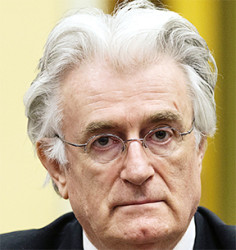THE HAGUE, (Reuters) – Former Bosnian Serb leader Radovan Karadzic was convicted by U.N. judges of genocide for the 1995 Srebrenica massacre, the worst war crime in Europe since World War Two, and sentenced to 40 years in prison.
Karadzic, 70, the former president of the breakaway Bosnian Serb Republic, was found guilty on 10 out of 11 charges brought by war crimes prosecutors at the International Criminal Tribunal for the Former Yugoslavia in The Hague. He would appeal the decision, his legal adviser said.

“The accused was the sole person within Republika Srpska (the Bosnian Serb Republic) with the power to prevent the killing of the Bosnian Muslim males,” said presiding judge O-Gon Kwok, in a reference to the 8,000 killed at Srebrenica.
“Far from preventing it, he ordered they be transferred elsewhere to be killed,” the judge said.
Karadzic was acquitted of one count of genocide in various towns across Bosnia during the war of the 1990s.
The three-judge panel said Karadzic was “at the apex of power,” heading the self-styled Bosnian Serb Republic and Supreme Commander of its armed forces, when crimes were committed by his troops.
Judges said the 44-month siege of Sarajevo could not have happened without his support; that he committed crimes against humanity in an attempt to purge Muslims and Croats from parts of Bosnia; and that he had intended to eliminate the Bosnian Muslim males of the town of Srebrenica.
Karadzic’s legal adviser Peter Robinson said Karadzic was “disappointed by the verdict, astonished by the reasoning and he wants to appeal.”
As the judges described the siege of Sarajevo, Karadzic looked pained and his face tightened into a grimace.
Victims’ families in the courtroom, some of then elderly, listened intently when the genocide at Srebrenica was discussed. One wiped away tears as the judge described men and boys being separated from their families.
When Karadzic was ordered to stand for sentencing, he listened with eyes mostly downcast. After judges departed, he sat back heavily in his chair.
Victims’ families embraced before quietly leaving the courtroom.
Outside, Hatidza Mehmedovic, who lost her entire family at Srebrenica, said she was enraged by the verdict, and no punishment could have been harsh enough.
“He can live in a cushy prison while I have to live in Srebrenica, where his ideology is still in place,” she said.
“I have no sisters, no brothers, no husband.”
Karadzic was arrested in 2008 after 11 years on the run, following a war in which 100,000 people were killed as rival armies carved Bosnia up along ethnic lines that largely survive today.





